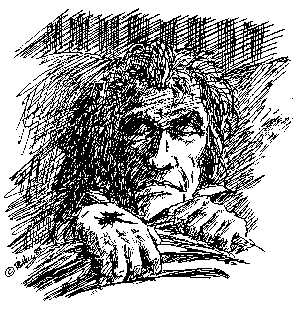The Strange Dream of John C. Calhoun
(from The Civil War in Song and Story, Frank Moore, Ed., New York, 1889. Illustrated for an old newsletter of mine by Harry Dierken.)
One morning John C. Calhoun and a number of his political associates were having breakfast together. Calhoun seemed to be behaving strangely, gazing frequently at his right hand and brushing it with his left in a nervous manner. At length one of his companions - Robert Toombs of Georgia, I think - took it upon himself to ask Calhoun if his hand hurt.
 "Pshaw! It is nothing but a dream I had last night which makes me see now a large black spot, like an ink blotch, upon the back of my right hand; an optical illusion, I suppose." These words excited the curiosity of the company and Toombs pressed on: "What was your dream like? I am not very superstitious about dreams, but sometimes they have a great deal of truth in them."
"Pshaw! It is nothing but a dream I had last night which makes me see now a large black spot, like an ink blotch, upon the back of my right hand; an optical illusion, I suppose." These words excited the curiosity of the company and Toombs pressed on: "What was your dream like? I am not very superstitious about dreams, but sometimes they have a great deal of truth in them."
After a moment's hesitation, Calhoun began to unravel his tale: At a late hour last night, as I was sitting in my room writing, I was astonished by the entrance of a visitor, who, without a word, took a seat opposite me. The manner in which the intruder entered, so perfectly self-possessed, as though my room and all within it belonged to him, excited in me as much surprise as indignation. As I raised my head to look into his features, I discovered that he was wrapped in a thin cloak which effectively concealed his face; then he spoke: "What are you writing, senator from South Carolina?"
I did not think of his impertinence at first, but answered voluntarily, "I am writing a plan for the dissolution of the American Union." (You know, gentlemen, that I am expected to produce a plan in the event of certain contingencies.) To this the intruder replied coolly, "Senator from South Carolina, will you allow me to look at your right hand?"
He rose, the cloak fell, and I saw his face. The sight struck me like a thunderclap. It was the face of a dead man whom extraordinary events had called back to life. The features were those of George Washington and he was dressed in his General's uniform.
As though I had not the power to refuse, I extended my right hand as requested. I felt a strange thrill as he grasped it and held it to the light. After holding my hand for a moment, he looked at me steadily and said in a quiet way, "And with this right hand, senator from South Carolina, you would sign your name to a paper declaring the Union dissolved?" "Yes," I said, "if a certain contingency arises." But at that moment a black blotch appeared on the back of my hand. "What is that?" said I, alarmed. "That," said he, "is the mark by which Benedict Arnold is known in the next world." He said no more but drew from beneath his cloak an object which he laid upon the table - a skeleton! "There," said he, "are the bones of Isaac Hayne, who was hung at Charleston by the British. He gave his life in order to establish the Union."
With these words the intruder left the room, and I, startled by contact with the dead man's bones, awoke. Was it not a singular dream?
